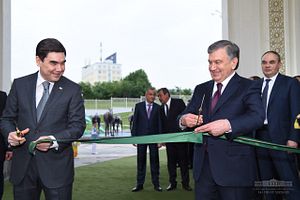Uzbekistan has reportedly agreed to participate in the massive Turkmenistan-Afghanistan-Pakistan-India (TAPI) pipeline. The news comes as Turkmen President Gurbanguly Berdimuhamedov paid a visit to Tashkent on Monday.
As the visit began, RFE/RL reported that sources had indicated TAPI was on the agenda, followed by Reuters reporting that Uzbek President Shavkat Mirziyoyev had told journalists after meeting with the Turkmen president, “We have agreed that Uzbekistan will also take part in this project.”
Reuters reports that while no further details were made available, Mirziyoyev said Uzbek experts would travel to Turkmenistan to discuss the issue further.
The TAPI project, which has an estimated price tag now of $10 billion, endeavors to bring 33 billion cubic meters of Turkmen gas to energy-starved South Asia for 30 years via a 1,800-kilometer pipeline that will stretch across Afghanistan. Construction is estimated to last two years, but it’s already been more than two years since Turkmenistan broke ground on its portion of the pipeline. Funding is a major question with few steady answers, with Ashgabat responsible for the bulk of the costs.
Without concrete details, we can merely speculate as to how Uzbekistan could contribute to the pipeline. Ostensibly, the Turkmen portion has been built (if you believe Ashgabat) and the Afghan portion began construction in February.
Uzbekistan reserves most of the natural gas it produces for domestic consumption but does export some to Kazakhstan, Russia, and China. It’s not clear that Uzbek involvement would include putting gas into the pipeline bound for Pakistan and India. Technical assistance seems to be what is on the table, for now.
Why would Uzbekistan jump onto the TAPI boat if not to export more gas? The rationale may be more politics than energy economics.
Berdimuhamedov’s visit to Tashkent was his first to Uzbekistan since attending previous Uzbek President Islam Karimov’s funeral in September 2016. Mirziyoyev made Turkmenistan the destination of his first trip abroad as president in March 2017. Though neighbors, Turkmenistan’s “positive neutrality” and resulting insular nature and the late Karimov’s combativeness and insularity have kept relations from deepening significantly.
Uzbekistan and Turkmenistan, for example, maintain visa regimes; Turkmenistan was not even among the 39 countries granted simplified visa procedures earlier this year by Uzbekistan. Citizens of every other Central Asian state can visia Uzbekistan without a visa (Kazakhs for 90 days, Kyrgyz for 60 days and Tajiks for 30 days).
There was certainly space to expand the Uzbek-Turkmen relationship and Mirziyoyev made good neighborliness a core facet of his presidency from the beginning. As such, the two presidents discussed strengthening their strategic partnership and deepening cooperation in various fields during Berdymuhamedov’s visit.
According to the Uzbek government, trade turnover between the two countries increased by 55 percent in the first quarter of 2018. Such a gain is indicative of the likely low starting point (Note: Finding exact figures has proven difficult, but Turkmenistan does not appear among Uzbekistan’s top trading partners). The aim is to bring bilateral trade up to $500 million by 2020. For comparison, trade turnover between Uzbekistan and Germany amounted to about $520 million in 2016. Uzbekistan has set a similar target for trade with Kyrgyzstan.
The two presidents were all smiles as they cut a green ribbon at the grand opening of the new Ashgabat Park in Tashkent, replete with Akhal-Teke horse statues in the fountains. We’ll have to keep an eye on how Uzbekistan’s TAPI involvement manifests but deep involvement seems unlikely. It could just be a talking point and a few technical advisers, or it could be something more.

































